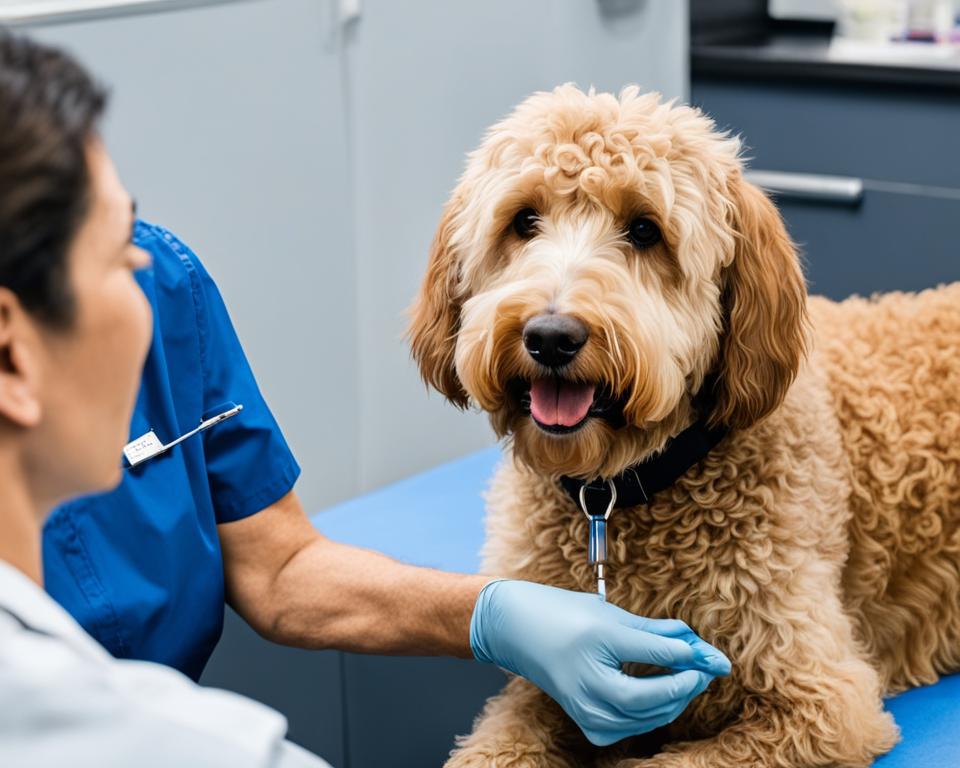Labradoodles are generally a healthy breed, but it is important for responsible breeders and owners to prioritize health screenings. Health screenings help identify potential genetic diseases and ensure the well-being of Labradoodles. By conducting health tests and screenings on breeding parents, breeders can minimize the risk of passing on heritable conditions to puppies. The Core health tests recommended for Labradoodle breeding include hip and elbow certifications, DNA testing for eye diseases, and general health checks. Additional screenings may be performed based on individual breeder practices.
Key Takeaways:
- Labradoodle health screenings play a vital role in identifying potential genetic diseases.
- Core health tests for Labradoodle breeding include hip and elbow certifications, DNA testing for eye diseases, and general health checks.
- Responsible breeders prioritize health screenings to reduce the risk of passing on heritable conditions to puppies.
- Additional screenings may be performed based on individual breeder practices.
- Labradoodle health screenings benefit the overall health and well-being of the breed.
Recommended Parent Dog Screening for Labradoodles
Responsible Labradoodle breeders understand the importance of conducting thorough health screenings on the parents of puppies. These screenings aim to identify potential genetic diseases and ensure the overall health and well-being of the breed. By prioritizing parent dog screenings, breeders can proactively minimize the risk of heritable conditions in Labradoodle puppies.
When it comes to parent dog screenings for Labradoodles, several key areas are recommended:
- Hip Certification: Labradoodles, like their parent breeds (Labradors and Poodles), can be prone to hip dysplasia. It is crucial to obtain hip certification through examinations such as Orthopedic Foundation for Animals (OFA) evaluations. By ensuring that parent dogs have healthy hips, breeders can reduce the risk of passing on this condition to their offspring.
- Elbow Certification: Elbow dysplasia is another condition that may affect Labradoodles. Screening the parent dogs for elbow dysplasia through certification programs, such as OFA or the International Elbow Working Group (IEWG), helps identify potential issues and allows breeders to make informed breeding decisions.
- DNA Testing for Eye Diseases: Labradoodles can inherit eye diseases from both Poodle and Labrador lines. DNA testing for conditions like Progressive Retinal Atrophy (PRA) is essential to identify carriers and ensure the selection of healthy parent dogs.
By conducting these screenings, breeders can select healthier parent dogs with reduced risks of heritable conditions, ultimately contributing to the overall health and well-being of Labradoodle puppies.
Labradoodle Parent Dog Screening Recommendations:
| Screening | Description |
|---|---|
| Hip Certification | Evaluating hip health through certification programs such as OFA or equivalent evaluations. |
| Elbow Certification | Assessing elbow joint health and potential dysplasia through certification programs like OFA or IEWG. |
| DNA Testing for Eye Diseases | Identifying carriers of eye diseases, such as PRA, to ensure healthier offspring. |
Image:
Common Health Conditions in Labradoodle Puppies
While responsible breeders strive to produce healthy Labradoodle puppies, there are certain health conditions that may occur in puppies regardless of breeding practices. It is important for prospective Labradoodle owners to be aware of these common health conditions and understand how to address them.
Tooth Problems in Labradoodle Puppies
One common health issue that Labradoodle puppies may experience is tooth problems, particularly incorrect positioning of baby teeth. This can cause discomfort, pain, and potential infection. It is crucial for owners to monitor their puppies’ dental health and seek veterinary care if any issues are observed. Regular teeth cleaning and proper dental hygiene can help prevent tooth problems in Labradoodle puppies.
Umbilical Hernias in Labradoodle Puppies
Another health condition that Labradoodle puppies may encounter is umbilical hernias. Umbilical hernias are small defects in the abdominal muscles around the belly button area. While most umbilical hernias are harmless and often close on their own as the puppy grows, some may require medical intervention if they do not resolve naturally. It is important for owners to consult with the breeder or a veterinarian if an umbilical hernia is observed in a Labradoodle puppy.
To provide a visual representation of the common health conditions in Labradoodle puppies, take a look at the image below:

It is essential for Labradoodle owners to educate themselves about these common health conditions and take appropriate measures to ensure the well-being of their puppies. Prompt veterinary care, regular check-ups, and a focus on preventive healthcare can contribute to raising healthy and happy Labradoodle puppies.
Common Health Conditions in Adult Labradoodles
Labradoodles, like any other breed, are prone to certain health conditions in adulthood. It is important for Labradoodle owners to be aware of these conditions and take necessary steps to address them for the well-being of their furry companions.
Anxiety
Anxiety is a common health condition in Labradoodles that can manifest through behaviors such as excessive barking, destructive chewing, or separation anxiety. It is essential for owners to provide a safe and secure environment, along with behavioral management techniques, to help alleviate anxiety in their Labradoodles.
Skin Allergies
Labradoodles may develop skin allergies, which can cause itching, redness, and irritation. These allergies can be triggered by various factors such as allergens in the environment, certain foods, or parasites. Proper veterinary care, including allergy testing and allergen avoidance, can help manage skin allergies and provide relief to Labradoodles.
Inflammatory Bowel Disease
Inflammatory bowel disease is a chronic condition that can affect Labradoodles’ digestive system, causing symptoms such as diarrhea, vomiting, and weight loss. Proper diagnosis by a veterinarian is crucial for identifying and managing this condition through dietary changes, medication, and regular monitoring.
Owners should always be vigilant about any changes in their Labradoodles’ behavior, skin, or digestive health and consult with a veterinarian for proper diagnosis and treatment. Early detection and intervention can greatly improve the quality of life for Labradoodles affected by these health conditions.

Labradoodle Health Condition Comparison Table
| Health Condition | Symptoms | Treatment |
|---|---|---|
| Anxiety | Excessive barking, destructive chewing, separation anxiety | Behavioral management, environmental enrichment, professional training |
| Skin Allergies | Itching, redness, irritation | Allergy testing, allergen avoidance, medication |
| Inflammatory Bowel Disease | Diarrhea, vomiting, weight loss | Dietary changes, medication, regular monitoring |
This table provides a quick comparison of common health conditions in adult Labradoodles, their symptoms, and recommended treatments. It is important to note that each Labradoodle is unique and may experience these conditions differently. Consulting with a qualified veterinarian is crucial for accurate diagnosis and individualized treatment plans.
Genetic and Physical Health Screening at Big Rock Labradoodles
At Big Rock Labradoodles, we are committed to ensuring the health and well-being of our dogs through rigorous genetic and physical health screenings. Our comprehensive genetic tests are designed to identify and eliminate hereditary diseases that may be present in Labradoodles. This includes screenings for conditions such as degenerative myelopathy, exercise-induced collapse, nasal parakeratosis, and progressive retinal atrophy. By identifying these diseases early on, we can take the necessary steps to prevent them from being passed on to future generations.
In addition to genetic screenings, we also prioritize physical health evaluations. Our Labradoodles undergo hip and elbow evaluations to assess joint health and identify any potential issues. These assessments help us breed dogs with strong hips and elbows, reducing the risk of conditions like hip dysplasia and elbow dysplasia. Furthermore, our Labradoodles undergo thorough eye examinations, including the OFA CAER eye exam, to detect any eye abnormalities and ensure optimal ocular health.
By conducting these genetic and physical health screenings, we can confidently say that our Labradoodles possess excellent genetic traits and physical health. We are dedicated to producing healthy dogs that can live long, happy lives with their owners. At Big Rock Labradoodles, we go above and beyond to ensure that our breeding practices prioritize the well-being of our dogs and contribute to the improvement of the Labradoodle breed as a whole.
FAQ
What are the important health screenings for Labradoodles?
Labradoodles should undergo health screenings to identify potential genetic diseases and ensure their well-being. The recommended tests include hip and elbow certifications, DNA testing for eye diseases, and general health checks.
What screenings are recommended for parent dogs of Labradoodles?
Parent dogs should undergo hip certification to reduce the risk of hip dysplasia, elbow certification to identify potential elbow dysplasia, and DNA testing for eye diseases such as Progressive Retinal Atrophy (PRA).
What are common health conditions in Labradoodle puppies?
Labradoodle puppies may experience tooth problems, such as incorrect positioning of baby teeth, and may also have umbilical hernias, which are small defects in the abdominal muscles.
What are common health conditions in adult Labradoodles?
Anxiety, skin allergies, and inflammatory bowel disease are some common health conditions that may affect adult Labradoodles.
What types of health screenings are performed at Big Rock Labradoodles?
At Big Rock Labradoodles, genetic tests are conducted to identify hereditary diseases, while physical examinations such as OFA CAER eye exams and hip and elbow evaluations help assess joint health and identify abnormalities.

Leave a Reply